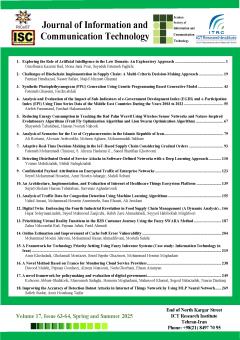Improving the accuracy of detection botnet attacks in Internet of Things network by using MLP neural network
Subject Areas : ICTSafieh Siadat 1 , Amir Tajfar 2 *
1 - Department of Computer, University of Payam Noor, Tehran, Iran
2 -
Keywords: Botnet, neural network, Internet of Things, Deep Learning,
Abstract :
Due to the increasing use of the Internet of Things around the world and the exponential increase in the number of devices connected to the network and the communication between them, the potential for security problems is increasing. Considering that many personal and public devices are connected to this network, any security problem can have unpredictable and significant consequences. Internet of Things applications include smart cities, smart transportation, responsive environments, and some other specific things that are directly controlled by users or digital devices, cyber-attacks through the Internet of Things and smart digital devices is the most important threat for these networks. So far, numerous researches have been conducted to detect Internet of Things attacks, in particular botnet attacks, as one of the most important attacks in this field. But the lack of a method that uses machine learning methods with high accuracy and low error to detect these attacks is strongly felt. In this research, by using the N-BaIoT dataset and Python simulator for modeling and also using deep learning methods and MLP neural network to evaluate and train the data (using the objective function and training), the neural system was used for detecting botnet attacks. This method obtained accuracy 90.35, precision 85.99, recall 90.53 and f1-score 87.50. Compared to other machine learning methods including random forest algorithm (RF), support vector machine algorithm (svm), K nearest neighbor algorithm (knn), XGBOOST algorithm, AdaBoost algorithm, the best result was obtained in all 4 evaluation parameters.
[1] El Mourabit, Y., et al., "Intrusion detection techniques in wireless sensor network using data mining algorithms: comparative evaluation based on attacks detection. International Journal of Advanced Computer Science and Applications", 2015. 6(9): p. 164-172.
[2] Lopez, O., et al., "Ultra-stable long distance optical frequency distribution using the Internet fiber network. Optics Express", 2012. 20(21): p. 23518-23526.
[3] Ashton, K., That "‘internet of things’ thing. RFID journal," 2009. 22(7): p. 97-114.
[4] Gershenfeld, N., R. Krikorian, and D. Cohen, "The internet of things. Scientific American", 2004. 291(4): p. 76-81.
[5] Ci, S., M. Guizani, and H. Sharif, "Adaptive clustering in wireless sensor networks by mining sensor energy data. Computer ommunications", 2007. 30(14-15): p. 2968-2975.
[6] Dias, J.P., et al. A brief overview of existing tools for testing the internet-of-things. in 2018 IEEE international conference on software testing, verification and validation workshops (ICSTW). 2018. IEEE.
[7] Klaib, A.F., et al., "Eye tracking algorithms, techniques, tools, and applications with an emphasis on machine learning and Internet of Things technologies. Expert Systems with Applications", 2021. 166: p. 114037.
[8] Alahmadi, B.A., et al. "BOTection: Bot detection by building Markov Chain models of bots network behavior". in Proceedings of the 15th ACM Asia Conference on Computer and Communications Security. 2020.
[9] Beskow, D.M. and K.M. Carley. "Bot conversations are different: leveraging network metrics for bot detection in twitter. in 2018 IEEE/ACM international Conference on Advances in Social Networks Analysis and Mining (ASONAM)". 2018. IEEE.
[10] Ioannou, C. and V. Vassiliou. "Classifying security attacks in IoT networks using supervised learning. in 2019 15th International conference on distributed computing in sensor systems (DCOSS)". 2019. IEEE.

